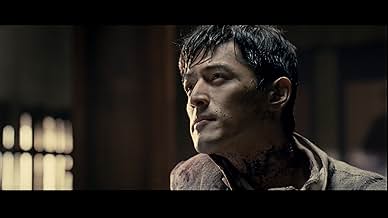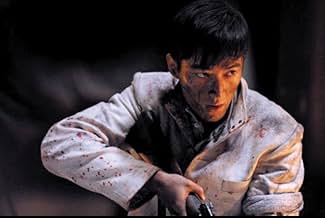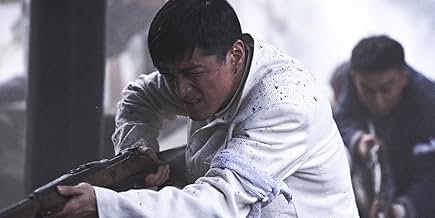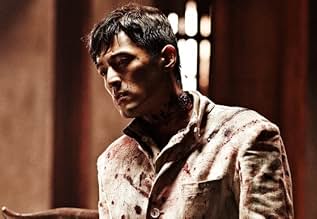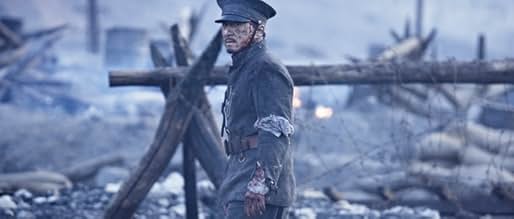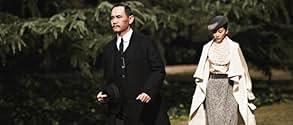NOTE IMDb
5,7/10
6,7 k
MA NOTE
Ajouter une intrigue dans votre langueA historical drama based on the founding of the Republic of China when nationalist forces led by Sun Yat-sen overthrew the Qing Dynasty.A historical drama based on the founding of the Republic of China when nationalist forces led by Sun Yat-sen overthrew the Qing Dynasty.A historical drama based on the founding of the Republic of China when nationalist forces led by Sun Yat-sen overthrew the Qing Dynasty.
- Réalisation
- Scénario
- Casting principal
- Récompenses
- 6 victoires et 7 nominations au total
Bingbing Li
- Xu Zonghan
- (as Bingbing Lee)
Jaycee Cho-Ming Chan
- Zhang Zhenwu
- (as Jaycee Chan)
Yu-Hang To
- Xiong Bingkun
- (as Dennis To)
Duobujie
- Feng Guozhang
- (as Duobuji)
Avis à la une
A historic film that doesn't work out well. Despite its rigor and historical interest, it's a not-so-smooth, confusing and uninteresting film. It seems to me that they had problems in the editing and it's a shame because it has an intense and modern scenography in the battle scenes, good interpretations.
It looks like a jigsaw puzzle where the pieces are forced to fit together and don't quite belong there, resulting in a confusing picture. Who knows if because of having so many directors...
It could have been a great historical epic, but it's not...
It looks like a jigsaw puzzle where the pieces are forced to fit together and don't quite belong there, resulting in a confusing picture. Who knows if because of having so many directors...
It could have been a great historical epic, but it's not...
Made to coincide with the centenary of the original event, 1911 REVOLUTION is a film that celebrates China's rise from the tyranny of the Qing dynasty into the modern era. It's an unashamedly patriotic movie, with clear-cut heroes and villains, and one that seeks to portray a politically complex situation in a massive country, on an international scale, in the space of two hours. The resultant film is an educational ride and historically interesting, but one that falls down when it comes to the basic facets of movie-making.
The film tries to be both a gutsy war film dominated by explosive battle sequences and a compelling political epic, featuring scenes from both sides involved in the revolution. Unfortunately, the editing is quite choppy and the battle scenes, although technically proficient, end up disappointing as you're left wanting more. Characterisation is virtually nil; Jackie bags the best role as the rebellious leader and has a few great action scenes, but everybody else feels like a player in a historical drama, never really coming to full life as they should. There are lots of familiar Chinese actors in various parts, but none of them make much of an impact here.
It's a shame, because there's a film with a similar focus, set five years previously, called BODYGUARDS & ASSASSINS, and I found it absolutely spellbinding. That movie manages to mix in the political intrigue and dramatic backdrop of the situation while at the same time telling a rollicking, action-packed storyline filled with melodrama and excitement. Yes, it was silly and over the top in places, but I'd rather that than this slightly stuffy and occasionally lifeless production that fails to engage the senses along with the intellect.
The film tries to be both a gutsy war film dominated by explosive battle sequences and a compelling political epic, featuring scenes from both sides involved in the revolution. Unfortunately, the editing is quite choppy and the battle scenes, although technically proficient, end up disappointing as you're left wanting more. Characterisation is virtually nil; Jackie bags the best role as the rebellious leader and has a few great action scenes, but everybody else feels like a player in a historical drama, never really coming to full life as they should. There are lots of familiar Chinese actors in various parts, but none of them make much of an impact here.
It's a shame, because there's a film with a similar focus, set five years previously, called BODYGUARDS & ASSASSINS, and I found it absolutely spellbinding. That movie manages to mix in the political intrigue and dramatic backdrop of the situation while at the same time telling a rollicking, action-packed storyline filled with melodrama and excitement. Yes, it was silly and over the top in places, but I'd rather that than this slightly stuffy and occasionally lifeless production that fails to engage the senses along with the intellect.
This film in a word is a mess.
The problem with a lot of historical dramas in general is that their historical scopes are too big to fit neatly into the format of a film. 1911 suffers the same weakness as many other recent "propaganda" movies from mainland China: Irrespective of their propagandistic flairs or contents, they are all trying to cover everything and quickly into a usual 2 hrs duration, a task impossible if not improbable to do well. One has to question how much creative freedom Jackie really had with directing it but even without outside pressure, we can intuit that even Jackie won't want to be liberal with a source material so sensitive and "weighty".
I am not going to delve into the history as you can find better information elsewhere but judging this historical film purely as film, it is unsatisfactory at best. If you want to learn about the 1911 Revolution then perhaps this film would give you a rundown of its historical development; it is mostly centred from the perspective of the revolutionary faction led by Dr. Sun Yat Sen, the founding father of modern nationhood and democracy in China.
As required, you would see plenty of explosions and scenes of war, albeit distributed rather evenly throughout the film, providing as bits of "action" before or after the "civil" and political acts by Sun Yat Sen and the other "players" in the political manoeuvres. The film is littered with bits of textual information supposed to fill you in on the historical facts and significances, but if you are not a fast reader, all of it would fly past your head unless you are a professor in the study of the Revolution. So right off the bat you are witnessing an educational material that lacks substance and depth but only provides you with a general picture and even incomplete at that.
With the typical colour filtering for battle scenes, you are treated with the usual grittiness of war. It is very apparent you are supposed to feel the up welling of emotion as men and women sacrificed their lives for the revolution but if anything, the scenes are so short that before you have the chance/time for up welling, it is over. All we know is that battles were fought, people died, and we move on to the (politic) next part. As a historical book, that is fine, as a movie, it does not work. (Granted some scenes might have been touching but within a film world crammed up with similar attempts at dragging out your inner weak spots, we are emotionally fatigued at best to be moved so easily.)
One would also be appalled at the film's treatment of westerners. They are stereotyped/caricatured and acted awkwardly, seemingly only needed for their appearances and that none of the people hired to act knows how to act. (I mean come on, this is the 21th century, aren't we smart enough now to see through all the old stereotypes and know that people aren't paper cutouts?)
Along with that comes some bad acting on the part of the Chinese casts, where most of them are either wooden or overly melodramatic, some even managed both. Even the Doctor at certain parts of the movie came out awkwardly.
Cinematography. This might be much more centred on my own personal opinion but I find some of the cuts and techniques trying too hard, focusing on style rather than lending itself to the story and the scenes. A lot of potentially good scenes are ruined by fast cuts and awkward transitions which in some cases even provide some hilarious results on a film so centred on seriousness, making it somewhat a deadpan.
I applaud Jackie for taking on directing but maybe perhaps this is not exactly the source material to work with. Personally I find historical films problematic in ways of execution, especially one about politics and dare I say revolutions? There is no way not to read a film like this in propagandistic terms. But then again can there be politic without propaganda? Maybe this one could be read as an irony? The solution to this is: Just don't take on so much, stop making epic political movies all together and give us something much more substantial than the emotionless husks we are always being offered in, dare I say, "sanctioned" art? (But in the case of China, this might be harder than one could imagine.) It is much better to focus on the smaller characters tangled within all these big events, see things from their eyes and get to understand the big picture. The detachment from human emotionality and focusing on the large picture history book-esque is only going to alienate people. For this story, as much as the personage of the doctor is "monumental" and of his endeavours, focus on Sun Yat Sen himself more, his personal struggles, what happens behind doors. Granted this would basically take the film into another direction but political epics just do not work.(At least I haven't seen it work. Western directors already understood the difficulty and infeasibility of trying to cover everything at once. Personally I haven't seen any western films done this way or similarly. If you have seen a successful one, please let me know, I want to learn.)
If a metaphor could be used for this film, then it is akin to watch the scenes outside a fast moving train. Some scenes are nicely shot, well acted, and some sidelined characters having much more commanding presence than the main ones (In this case, I am speaking to the limited screen time roles played by Joan Chen as Empress Dowager Longyu and Chun Sun as Marshal Yuan Shi Kai), but the train is just going too fast for you to take a good look. All this makes you rather be out there...
The problem with a lot of historical dramas in general is that their historical scopes are too big to fit neatly into the format of a film. 1911 suffers the same weakness as many other recent "propaganda" movies from mainland China: Irrespective of their propagandistic flairs or contents, they are all trying to cover everything and quickly into a usual 2 hrs duration, a task impossible if not improbable to do well. One has to question how much creative freedom Jackie really had with directing it but even without outside pressure, we can intuit that even Jackie won't want to be liberal with a source material so sensitive and "weighty".
I am not going to delve into the history as you can find better information elsewhere but judging this historical film purely as film, it is unsatisfactory at best. If you want to learn about the 1911 Revolution then perhaps this film would give you a rundown of its historical development; it is mostly centred from the perspective of the revolutionary faction led by Dr. Sun Yat Sen, the founding father of modern nationhood and democracy in China.
As required, you would see plenty of explosions and scenes of war, albeit distributed rather evenly throughout the film, providing as bits of "action" before or after the "civil" and political acts by Sun Yat Sen and the other "players" in the political manoeuvres. The film is littered with bits of textual information supposed to fill you in on the historical facts and significances, but if you are not a fast reader, all of it would fly past your head unless you are a professor in the study of the Revolution. So right off the bat you are witnessing an educational material that lacks substance and depth but only provides you with a general picture and even incomplete at that.
With the typical colour filtering for battle scenes, you are treated with the usual grittiness of war. It is very apparent you are supposed to feel the up welling of emotion as men and women sacrificed their lives for the revolution but if anything, the scenes are so short that before you have the chance/time for up welling, it is over. All we know is that battles were fought, people died, and we move on to the (politic) next part. As a historical book, that is fine, as a movie, it does not work. (Granted some scenes might have been touching but within a film world crammed up with similar attempts at dragging out your inner weak spots, we are emotionally fatigued at best to be moved so easily.)
One would also be appalled at the film's treatment of westerners. They are stereotyped/caricatured and acted awkwardly, seemingly only needed for their appearances and that none of the people hired to act knows how to act. (I mean come on, this is the 21th century, aren't we smart enough now to see through all the old stereotypes and know that people aren't paper cutouts?)
Along with that comes some bad acting on the part of the Chinese casts, where most of them are either wooden or overly melodramatic, some even managed both. Even the Doctor at certain parts of the movie came out awkwardly.
Cinematography. This might be much more centred on my own personal opinion but I find some of the cuts and techniques trying too hard, focusing on style rather than lending itself to the story and the scenes. A lot of potentially good scenes are ruined by fast cuts and awkward transitions which in some cases even provide some hilarious results on a film so centred on seriousness, making it somewhat a deadpan.
I applaud Jackie for taking on directing but maybe perhaps this is not exactly the source material to work with. Personally I find historical films problematic in ways of execution, especially one about politics and dare I say revolutions? There is no way not to read a film like this in propagandistic terms. But then again can there be politic without propaganda? Maybe this one could be read as an irony? The solution to this is: Just don't take on so much, stop making epic political movies all together and give us something much more substantial than the emotionless husks we are always being offered in, dare I say, "sanctioned" art? (But in the case of China, this might be harder than one could imagine.) It is much better to focus on the smaller characters tangled within all these big events, see things from their eyes and get to understand the big picture. The detachment from human emotionality and focusing on the large picture history book-esque is only going to alienate people. For this story, as much as the personage of the doctor is "monumental" and of his endeavours, focus on Sun Yat Sen himself more, his personal struggles, what happens behind doors. Granted this would basically take the film into another direction but political epics just do not work.(At least I haven't seen it work. Western directors already understood the difficulty and infeasibility of trying to cover everything at once. Personally I haven't seen any western films done this way or similarly. If you have seen a successful one, please let me know, I want to learn.)
If a metaphor could be used for this film, then it is akin to watch the scenes outside a fast moving train. Some scenes are nicely shot, well acted, and some sidelined characters having much more commanding presence than the main ones (In this case, I am speaking to the limited screen time roles played by Joan Chen as Empress Dowager Longyu and Chun Sun as Marshal Yuan Shi Kai), but the train is just going too fast for you to take a good look. All this makes you rather be out there...
I saw this film on Oct. 9th. 2011. It moves quite quickly at the beginning and there is a lot of war action portrayed in the failed attempts to overthrow the Qing Empire. Chartracters are all identified and that is the only part of the film that detracts from the viewing. The film is in Chinese and by the time you have read the subtitles the characters names are gone. The film is enjoyable if you know Chinese history of this period and if you don't it can be just a series of talking and action scenes and can be quite confusing. Sun yat-sen is the main character but Jackie Chan does get to be more than just an action figure. If you want to more about this period of Chinese this would be the movie to spur you on or illustrate better what was going on in China at this time. Yuan Shi-kai is one character who has appeared in a lot of historical films portraying this period and his actions are as always ones of greed and betrayal.
I'm afraid I have to disagree with the other reviewers. I just spent $4.99 renting this film from Time Warner Cable and it was not money well spent. Having been excited by the splendid and creative resurgence of Chinese cinema in the reform period, especially in the 1980s when it burst on the international scene with classics like Yellow Earth (Huang Tudi), it was surprising to see such a throwback to the 1950s and 1960s. This is very much like The Opium War, though the battleship in this film is clearly not a model. In those days (the 1960s), western actors were not available, since China was closed to the outside world, so they had to use some of the few expatriate English language teachers. It looks like they have done the same this time, though surely Jackie Chan could have got anyone he wanted from Hollywood. The characterisation is one- dimensional. The dialogue sounds like it is from the history books, with the film merely providing visual illustration. There are lots of close- ups of Sun Yat-sen taken from below or with him standing in a presidential position, exactly like the shots of Mao Zedong in earlier films about the Communist revolution. This is understandable -- Sun has always been considered the "father of the nation" (guo fu) by both the Communists and the Guomindang, who warred for decades -- but Sun is too interesting a character to be treated to the standard Stalinist "cult of personality" adulation. He was not, after all, a Kim Jong-Il. He was a real politician. He wrote a development plan for China. He planned, but did not live to lead, a Northern Expedition to reunite China under a republican government. The style of the movie seems to be heavily influenced by pre-war Soviet films (not, though, those of the brilliant Eisenstein and Pudovkin). It is surprising that Jackie Chan co-directed it. Surely he could have injected much more of his own cheeky humour? this film is so old-fashioned. I agree it would not have been centenary- reverential to have had fast cuts and rap music, but the slow-motion sentimental flashbacks are so hackneyed. Politically, the film doesn't say anything interesting and blithely ignores the unconscious irony of Sun saying that the Chinese people can now choose their own leaders after two hundred years of monarchy. One hundred years later, they still can't.
Le saviez-vous
- AnecdotesJackie Chan's one hundredth movie.
- GaffesWhen the revolutionary leader is on the ocean liner heading for China, the lifeboats on deck are too modern: they are painted bright orange and have built-in engines (note the propellers). The movie is set in 1911, so none of these characteristics would be present. Lifeboats of that era were rowboats, usually painted white.
- Citations
Sun Yat-Sen: The goal of revolution isn't death, but to change fate. Young people are sacrificing themselves for the revolution, so that the living can lead better lives.
- Versions alternativesThe original version has a run time of 121 minutes. The more common release is only 99 minutes long
Meilleurs choix
Connectez-vous pour évaluer et suivre la liste de favoris afin de recevoir des recommandations personnalisées
- How long is 1911?Alimenté par Alexa
Détails
- Date de sortie
- Pays d’origine
- Site officiel
- Langues
- Aussi connu sous le nom de
- 1911
- Sociétés de production
- Voir plus de crédits d'entreprise sur IMDbPro
Box-office
- Budget
- 18 000 000 $US (estimé)
- Montant brut aux États-Unis et au Canada
- 135 739 $US
- Week-end de sortie aux États-Unis et au Canada
- 55 850 $US
- 9 oct. 2011
- Montant brut mondial
- 3 807 134 $US
- Durée
- 1h 39min(99 min)
- Couleur
- Mixage
- Rapport de forme
- 2.35 : 1
Contribuer à cette page
Suggérer une modification ou ajouter du contenu manquant


